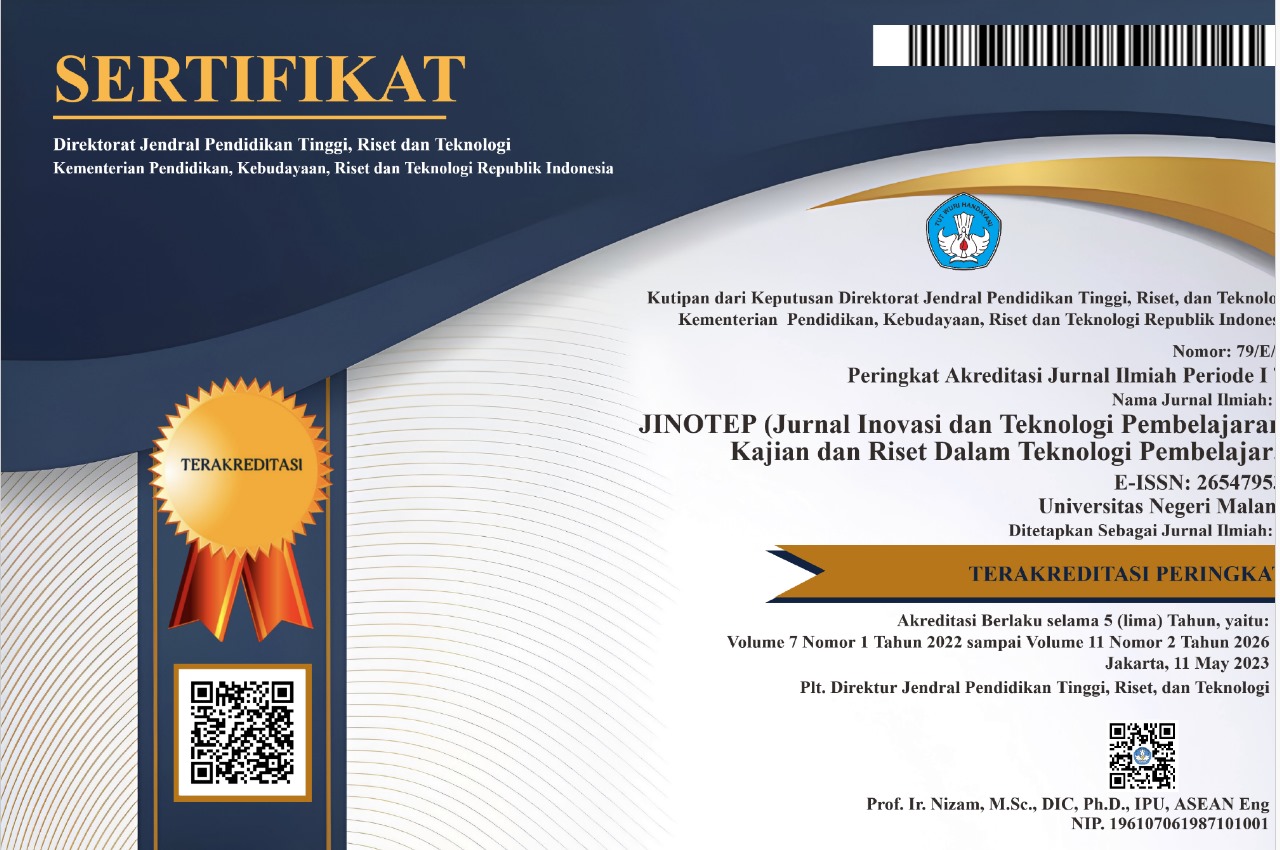Pengembangan Aplikasi Mobile Learning untuk Perangkat Pembelajaran Berbasis Education for Sustainable Development
Abstract
Abstrak: Penelitian ini bertujuan untuk mengembangkan aplikasi mobile learning perangkat pembelajaran berbasis Education for Sustainable Development (ESD). Jenis penelitian ini yaitu penelitian dan pengembangan dengan teknik pengumpulan data diantaranya observasi, wawancara dan Focus Group Discussion (FGD). Data hasil observasi dan wawancara menjadi bahan studi pendahuluan untuk mengetahui ketersediaan perangkat pembelajaran di sekolah dasar. Proses FGD dilaksanakan oleh tim pengembang yang terdiri dari 7 orang dan 1 orang tim ahli. Melalui proses FGD dihasilkan kesepakatan tim untuk mengembangkan aplikasi mobile learning perangkat pembelajaran berbasis ESD yang mencakup konsep ESD, dokumen perangkat pembelajaran serta video penggunaan perangkat pembelajaran berbasis ESD. Produk aplikasi mobile learning perangkat pembelajaran berbasis ESD masih pada tahap versi alpha (V.0.01.1). Sebab, hasil validasi produk oleh beberapa ahli menunjukkan bahwa aplikasi masih memerlukan perbaikan berupa pengurangan atau penembahan fitur.
Abstract: This research aims to develop a mobile learning application based on Education for Sustainable Development (ESD). This type of research is research and development with data collection techniques including observation, interview, and Focus Group Discussion (FGD). Observation and interview data become preliminary study materials to determine the availability of learning tools in elementary schools. The FGD process is carried out by a development team of 7 people and 1 expert team. Through the FGD process, a team agreement was produced to develop an ESD-based learning device mobile learning application that includes the concept of ESD, learning device documents, and video usage of ESD-based learning tools. ESD-based learning device mobile learning application product is still at alpha version stage (V.0.01.1). Because, the results of product validation by some experts show that the application still needs improvement in the form of reduction or deed of features.
Keywords
Full Text:
PDFReferences
Ally, M., & Prieto-Blázquez, J. (2014). What Is the Future of Mobile Learning in Education? RUSC. Revista de Universidad y Sociedad Del Conocimiento, 11(1), 142–151. https://doi.org/10.7238/rusc.v11i1.2033
Anggraeni, R. D., & Kustijono, R. (2013). Pengembangan Media Animasi Fisika Pada Materi Cahaya dengan Aplikasi Flash Berbasis Android. Jurnal Penelitian Fisika Dan Aplikasinya (JPFA), 3(1), 11–18. https://doi.org/10.26740/jpfa.v3n1.p11-18
Arif, M. A., & Pandaan, N. U. (2018). Pengembangan Mobile Learning Berbasis Smartphone Android Materi Huruf Hiragana Pelatihan Bahasa Jepang SMA Ma’arif NU Pandaan. JINOTEP (Jurnal Inovasi Dan Teknologi Pembelajaran): Kajian Dan Riset Dalam Teknologi Pembelajaran, 4(2), 138–142.
Fibonacci, A., Azizati, Z., & Wahyudi, T. (2020). Development of Education for Sustainable Development (ESD) Based Chemsdro Mobile Based Learning for Indonesian Junior High School: Rate of Reaction. JTK (Jurnal Tadris Kimiya), 5(1), 26–34. https://doi.org/10.15575/jtk.v5i1.5908
Firdaus, S., & Hamdu, G. (2020). Pengembangan Mobile Learning Video Pembelajaran Berbasis STEM (Science, Technology, Engineering And Mathematics) Di Sekolah Dasar. JINOTEP (Jurnal Inovasi Dan Teknologi Pembelajaran): Kajian Dan Riset Dalam Teknologi Pembelajaran, 7(2), 66–75. https://doi.org/10.17977/um031v7i22020p066
Hasrawati. (2016). Perangkat Pembelajaran Tematik di SD. AULADUNA: Jurnal Pendidikan Dasar Islam, 3(1), 37–49. https://doi.org/https://doi.org/10.24252/auladuna.v3i1a5.2016 PERANGKAT
Hasslöf, H., & Malmberg, C. (2015). Critical Thinking as Room for Subjectification in Education for Sustainable Development. Environmental Education Research, 21(2), 239–255. https://doi.org/10.1080/13504622.2014.940854
Hedefalk, M., Almqvist, J., & Östman, L. (2015). Education for Sustainable Development in Early Childhood Education: a Review of the Research Literature. Environmental Education Research, 21(7), 975–990. https://doi.org/10.1080/13504622.2014.971716
Hidayat, S. (2020). Peningkatan Kemampuan Guru dalam Menyusun Perangkat Pembelajaran Melalui Pelaksanaan Supervisi. Didaktikum: Jurnal Penelitian Tindakan Kelas, 20(1), 1–7.
Hoffmann, T., & Siege, H. (2018). What is Education for Sustainable Development (ESD)? Human Development, 1(8), 1–6. http://www.esd-expert.net/files/ESD-Expert/pdf/Was_wir_tun/Lehr- und Lernmaterialien/What_is_Education_for_Sustainable_Development.pdf%0Ahttp://www.esd-expert.net/teaching-and-learning-materials.html
Kasirah, I. (2015). Development of Teaching Materials Esd (Education for Sustainable Development) in Coaching Skills of Self Children With Intellectual Challenges in SMA LB C in Jakarta. Jurnal Ilmiah Pendidikan Lingkungan Dan Pembangunan, 16(02), 115–121. https://doi.org/10.21009/plpb.162.04
Kim, J. (2020). Voices of Youth in Reconceptualising and Repositioning the Role of Mobile Learning for Sustainable Development. Information Technology for Development, 26(4), 711–727. https://doi.org/10.1080/02681102.2020.1749537
Liu, J. (2009). Education for Sustainable Development in Teacher Education: Issues in the Case of York University in Canada. Asian Social Science, 5(5), 46–49. https://doi.org/10.5539/ass.v5n5p46
Mahat, H., & Idrus, S. (2017). Education for Sustainable Development in Malaysia: a Study of Teacher and Student Awareness. Geografia : Malaysian Journal of Society and Space, 12(6), 77–88.
Muyadi. (2020). Upaya Meningkatkan Pemahaman Guru Tentang Penyusunan Perangkat Pembelajaran “KURTILAS” Melalui IHY dan Pendampingan Kelas Bagi Guru-guru di SDN Cepoko 3 Kecamatan Sumber Probolinggo. Jurnal Pedagogy:Jurnal Ilmiah Ilmu Pendidikan, 7(1), 85–89.
Nasibulina, A. (2017). Education for Sustainable Development. Advances in Human Factors, Business Management, Training and Education, 947–954. https://doi.org/10.1007/978-3-319-42070-7_87
Nasution, N., Prasetyo, K., & Jacky, M. (2020). Validitas Perangkat Pembelajaran Berbasis Education For Sustainable Development Pada Mata Pelajaran IPS di Sekolah Menengah Pertama. The Indonesian Journal of Social Studies, 3(1), 13. https://doi.org/10.26740/ijss.v3n1.p13-20
Padmanabhan, J. (2016). Does Integrated Approach to ESD Affect Critical Thinking on Sustainable Development? Journal of Education and Applied Social Studies, 7(3), 311–321.
Rahman, A., Heryanti, L. M., & Ekanara, B. (2019). Pengembangan Modul Berbasis Education for Sustainable Development pada Konsep Ekologi untuk Siswa Kelas X SMA. Jurnal Eksakta Pendidikan (JEP), 3(1), 1–8. https://doi.org/10.24036/jep/vol3-iss1/273
Rorita, M., Ulfa, S., & Wedi, A. (2018). Pengembangan Multimedia Interaktif Berbasis Mobile Learning Pokok Bahasan Perkembangan Teori Atom Mata Pelajaran Kimia Kelas X Sma Panjura Malang. JINOTEP (Jurnal Inovasi Dan Teknologi Pembelajaran) Kajian Dan Riset Dalam Teknologi Pembelajaran, 4(2), 70–75. https://doi.org/10.17977/um031v4i22018p070
Schibeci, R. A., & Williams, A. J. (2014). Science Communication and Desalination Research: Water experts’ views. International Journal of Science Education, Part B: Communication and Public Engagement, 4(1), 92–106. https://doi.org/10.1080/21548455.2013.810826
Sudaryono. (2018). Metodologi Penelitian Kuantitatif, Kualitatif, dan Mix Method (Kedua). PT Rajagrafindo Persada.
Sugiyono. (2012). Metode Penelitian Pendidikan (Pendekatan Kuantitatif, Kualitatif, dan R&D) (11th ed.). Alfabeta.
Sulisworo, D., Ishafit, & Firdausy, K. (2016). The Development of Mobile Learning Application using Jigsaw Technique. International Journal of Interactive Mobile Technologies, 10(3), 11–16. https://doi.org/10.3991/ijim.v10i3.5268
Supriatna, N., Romadona, N. F., Saputri, A. E., & Darmayanti, M. (2018). Implementasi Education for Sustainble Development (ESD) Ecopedagogy dalam Pembelajaran Tematik Terpadu di Sekolah Dasar. Primaria Educationem Journal, 1(2), 80–86.
Surahman, E. (2019). Integrated Mobile Learning System (Imoles) Sebagai Upaya Mewujudkan Masyarakat Pebelajar Unggul Era Digital. JINOTEP (Jurnal Inovasi Dan Teknologi Pembelajaran) Kajian Dan Riset Dalam Teknologi Pembelajaran, 5(2), 50–56. https://doi.org/10.17977/um031v5i22019p050
Syaparuddin, S., & Elihami, E. (2020). Peningkatan Motivasi Belajar Siswa Melalui Video pada Pembelajaran PKn di Sekolah Paket C. Jurnal Edukasi Nonformal, 1(1), 187–200. https://ummaspul.e-journal.id/JENFOL/article/view/318
Talakua, C., & Sesca Elly, S. (2020). Pengaruh Penggunaan Media Pembelajaran Biologi Berbasis Mobile Learning terhadap Minat dan Kemampuan Berpikir Kreatif Siswa SMA Kota Masohi. Biodik: Jurnal Ilmiah Pendidikan Biologi, 6(1), 46–57. https://doi.org/10.22437/bio.v6i1.8061
Tarigan, I. J., Sihombing, P., Sirait, P., Sembiring, R. W., & Simanjuntak, H. E. (2019). Embedding the Operating System : A Case Study LMDE 3 on a USB Flash Drive. Journal of Physics: Conference Series, 1361(1), 1–7. https://doi.org/10.1088/1742-6596/1361/1/012025
UNESCO. (2006). Framework for the UNDESD International Implementation Scheme. UNESCO Education Sector. http://library1.nida.ac.th/termpaper6/sd/2554/19755.pdf
UNESCO. (2012). Education for Sustainable Development. United Nations Educational, Scientific and Cultural Organization.
UNESCO. (2015). Rethinking Education Towards a Global Common Good? UNESCO Publishing. http://www.unesco.org/fileadmin/MULTIMEDIA/FIELD/Cairo/images/RethinkingEducation.pdf
UNESCO. (2017). Education for Sustainable Development Goals Learning Objectives. Peace and Sustainable Development, Education Sector.
Warsita, B. (2010). Mobile Learning Sebagai Model Pembelajaran Yang Efektif Dan Inovatif. Jurnal Teknodik, 14(1), 62–73. https://doi.org/10.32550/teknodik.v14i1.452
WHO, & UNICEF. (2014). Progress on Drinking Water and Sanitation (pp. 1–80). WHO Library Cataloguing in Publication Data.
Wihidayat, E. S., & Maryono, D. (2017). Pengembangan Aplikasi Android Menggunakan Integrated Development Environment (IDE) App Inventor-2. Edutic - Scientific Journal of Informatics Education, 4(1), 1–12. https://doi.org/10.21107/edutic.v4i1.3229
Yulistyorini, A. (2011). Pemanenan Air Hujan Sebagai Alternatif Pengelolaan Sumberdaya Air di Perkotaan. Teknologi Dan Kejuruan, 34(1), 105–114. http://journal.um.ac.id/index.php/teknologi-kejuruan/article/view/3024/408
DOI: http://dx.doi.org/10.17977/um031v8i22021p134
Refbacks
- There are currently no refbacks.
Copyright (c) 2021 Ajeng Fitria, Ghullam Hamdu

This work is licensed under a Creative Commons Attribution-ShareAlike 4.0 International License.
======================================================================
Jurnal Inovasi dan Teknologi Pembelajaran published by Universitas Negeri Malang in collaboration with the Asosiasi Program Studi Teknologi Pendidikan Indonesia (APS TPI) and Ikatan Profesi Teknologi Pendidikan Indonesia (IPTPI) with a MoU.
Publisher Address:
Educational Technology Laboratorium, Building D5, 1st Floor
Faculty of Education, Universitas Negeri Malang
Semarang St. No. 5, Malang City, East Java Province, Postal Code 65145
Email: jinotep.fip@um.ac.id
======================================================================

JINOTEP is licensed under a Creative Commons Attribution-ShareAlike 4.0 International License.
JINOTEP Statistics (Since July 13th, 2020)



.png)




.png)
1.png)
1.png)
4.png)
2.png)
1.png)
1.png)
.png)


_3.png)





1.png)
.png)